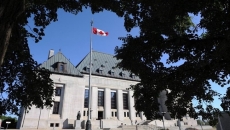Prime Minister Justin Trudeau is set to leave Monday for a weeklong trip to Asia, where he will make his first official visit to South Korea and attend the G7 leaders' summit in Japan.
The trip comes at a time when the world is collectively facing security threats and economic uncertainty magnified by climate change.
The prime minister is expected to be in Seoul between May 16 and May 18, after South Korean President Yoon Suk Yeol's visit to Ottawa last fall. Since then, both countries have released their Indo-Pacific strategies, plans that aim to counterbalance Chinese influence by increasing economic and military ties in the region.
Trudeau is also scheduled to attend the G7 leaders' summit in Hiroshima, Japan, between May 19 and 21.
As G7 host, Japan says it chose to have the summit in Hiroshima to symbolize its "commitment to peace" during a time of growing risk of weapons of mass destruction and an ongoing war in Ukraine.
The United States dropped the world's first atomic bomb on Hiroshima on Aug. 6, 1945, destroying the city and killing 140,000 people. It dropped a second bomb three days later on Nagasaki, killing 70,000 more.
While in Seoul, Trudeau is expected to attend a ceremony to open the Kapyong Battle Commemorative Trail, meant to honour Canada's contributions during the Korean War.
He is not expected to visit the demilitarized zone separating North and South Korea.
Leaders of G7 countries — Canada, the United States, the United Kingdom, Germany, France, Italy and Japan — meet annually to collaborate on shared goals. This year's summit will focus on seven main agenda items, including geopolitical and global security issues, economic resilience, and climate change and energy.
"I think it's going to be one of the most successful summits ever since they started in 1975," said John Kirton, a political science professor who heads the G7 research group at the University of Toronto.
"Because never before has a G7 summit faced so many big, interconnected global crises all at once."
As they reflect on the lessons learned from the COVID-19 pandemic, face an uncertain economic outlook and work to avoid a climate crisis, Kirton says the G7 leaders have no shortage of issues to tackle.
One of Canada's top priorities will be strengthening ties between the allied countries to address these converging challenges. Canada is expected to seek the G7 members' co-operation on providing ongoing support to Ukraine as well as addressing climate change.
The Liberal government is investing heavily in the green economy transition, arguing that promoting cleaner sources of energy and technology will bring economic prosperity to the country while curbing the risk of catastrophic climate change.
In a statement Trudeau provided to Kirton's group before the summit, the prime minister links addressing climate change with increased security.
"The clean economy presents a once-in-a-generation opportunity to not only keep 1.5 degrees Celsius of warming within reach and to avert the worst impacts of climate change, but also to create and secure good, middle-class jobs for our people and grow our economies," Trudeau wrote.
"When we cut emissions we can drive economic growth and build new strong, reliable supply chains that reduce our reliance on raw materials and components from countries such as China and Russia, too. This is economic policy, it is climate policy and it is security policy."
The clean economy transition is also expected to be the focus of Trudeau's visit to South Korea.
In an interview with The Canadian Press, South Korea's ambassador to Canada, Lim Woongsoon, said it will be at "the top of the agenda." Lim said South Korea is interested in increasing business ties in areas such as clean fuel and critical minerals.
"Canada can be a very ideal partner for Korean companies to manufacture electric vehicle batteries and battery components," he said.
The trip comes as Canada attempts to strengthen its relationships with Japan and South Korea, which are longtime allies and trading partners.
Foreign Affairs Minister Mélanie Joly has said the relationship with each is so natural that Ottawa has at times taken it for granted, but that global instability is a time to shore up these bonds.
"We want to be as close to Korea, to Japan as (we are) to Germany, France and Great Britain; that's our goal," Joly said last December.






